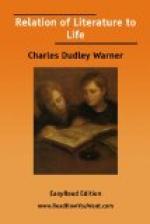The Bible is the best illustration of the literature of power, for it always concerns itself with life, it touches it at all points. And this is the test of any piece of literature—its universal appeal to human nature. When I consider the narrow limitations of the Pilgrim households, the absence of luxury, the presence of danger and hardship, the harsh laws—only less severe than the contemporary laws of England and Virginia—the weary drudgery, the few pleasures, the curb upon the expression of emotion and of tenderness, the ascetic repression of worldly thought, the absence of poetry in the routine occupations and conditions, I can feel what the Bible must have been to them. It was an open door into a world where emotion is expressed, where imagination can range, where love and longing find a language, where imagery is given to every noble and suppressed passion of the soul, where every aspiration finds wings. It was history, or, as Thucydides said, philosophy teaching by example; it was the romance of real life; it was entertainment unfailing; the wonder-book of childhood, the volume of sweet sentiment to the shy maiden, the sword to the soldier, the inciter of the youth to heroic enduring of hardness, it was the refuge of the aged in failing activity. Perhaps we can nowhere find a better illustration of the true relation of literature to life than in this example.
Let us consider the comparative value of literature to mankind. By comparative value I mean its worth to men in comparison with other things of acknowledged importance, such as the creation of industries, the government of States, the manipulation of the politics of an age, the achievements in war and discovery, and the lives of admirable men. It needs a certain perspective to judge of this aright, for the near and the immediate always assume importance. The work that an age has on hand, whether it be discovery, conquest, the wars that determine boundaries or are fought for policies, the industries that develop a country or affect the character of a people, the wielding of power, the accumulation of fortunes, the various activities of any given civilization or period, assume such enormous proportions to those engaged in them that such a modest thing as the literary product seems insignificant in comparison; and hence it is that the man of action always holds in slight esteem the man of thought, and especially the expresser of feeling and emotion, the poet and the humorist. It is only when we look back over the ages, when civilizations




